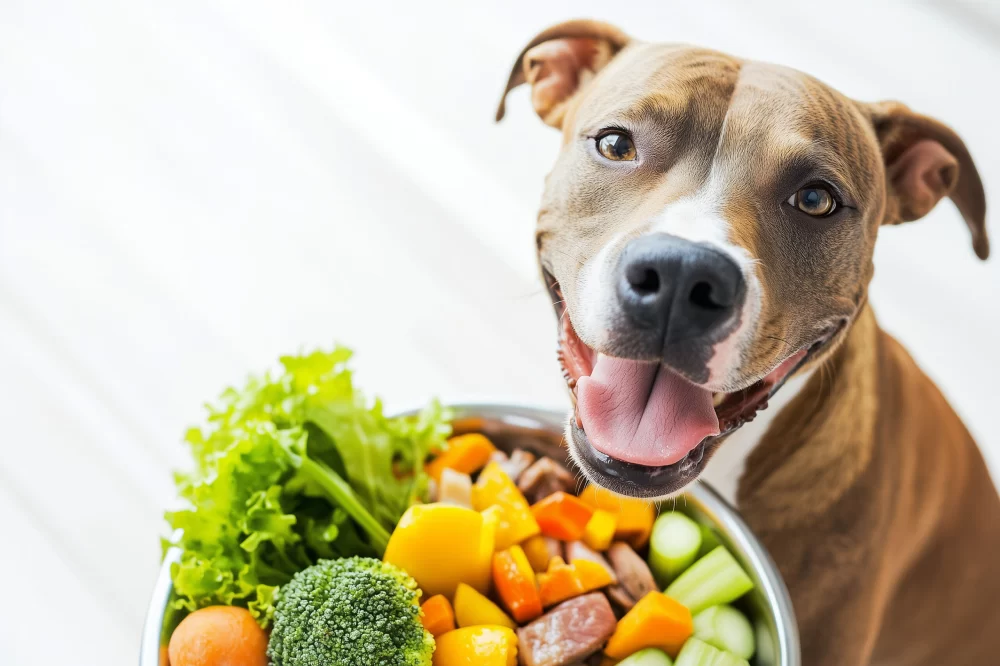Homemade Dog Food for Dogs with Allergies and Sensitive Digestion: A Complete Guide
- 1. Why Choose Homemade Dog Food for Allergies and Sensitive Digestion?
- 2. Common Ingredients to Avoid in Homemade Dog Food
- 3. Essential Ingredients for Homemade Dog Food for Sensitive Digestion
- 4. Easy and Nutritious Homemade Dog Food Recipes for Allergies
- 5. How to Transition Your Dog to Homemade Food
- 6. Real-Life Success Stories of Dogs with Sensitive Digestion
1. Why Choose Homemade Dog Food for Allergies and Sensitive Digestion?
As pet owners, we all want the best for our dogs, especially when they suffer from allergies or have sensitive digestion. While commercial dog food often includes artificial additives, preservatives, and unclear sources of proteins, homemade dog food offers a transparent and tailored solution. When you prepare your dog’s food at home, you have complete control over the ingredients, ensuring your dog gets the best quality nutrition that aligns with their specific dietary needs.
Homemade dog food is particularly beneficial for dogs with allergies or sensitive digestion because it allows you to avoid common allergens found in store-bought dog food, such as gluten, soy, or dairy. By making your dog’s food from scratch, you can select ingredients that promote digestive health and alleviate common allergy symptoms like itching, ear infections, and upset stomachs.
This article will explore how homemade dog food can help alleviate allergies and sensitive digestion, offer simple recipes to try, and give tips on transitioning your dog to a homemade diet that suits their health needs.
2. Common Ingredients to Avoid in Homemade Dog Food
While homemade dog food offers control over ingredients, it's essential to know which ingredients can trigger allergies or upset your dog’s digestion. Here are some common ingredients to avoid when preparing food for dogs with allergies and sensitive stomachs:
- Grains: Some dogs with sensitive digestion may struggle with grains like wheat, corn, and soy. These ingredients can cause bloating, gas, or discomfort. Opt for grain-free alternatives like sweet potatoes or quinoa.
- Dairy: Dairy products can be difficult for dogs to digest, especially those with lactose intolerance. Avoid milk, cheese, and yogurt, which could cause diarrhea or stomach upset.
- Artificial Additives: Many commercial dog foods contain artificial flavors, colors, and preservatives. These can exacerbate allergy symptoms and digestive issues. Stick to whole, natural ingredients when cooking at home.
- Processed Meats: Some processed meats, such as hot dogs or deli meats, may contain preservatives, fillers, and chemicals that are harmful to your dog. Always use fresh, high-quality proteins for homemade meals.
By avoiding these ingredients, you’ll create a much more suitable diet for your dog, promoting better digestion and reducing the risk of allergy flare-ups.
3. Essential Ingredients for Homemade Dog Food for Sensitive Digestion
When making homemade food for dogs with sensitive digestion, it’s important to focus on ingredients that are gentle on the stomach and provide balanced nutrition. Here are some key ingredients to include in your dog’s diet:
- Lean Proteins: Protein is essential for your dog’s muscle and tissue health. Good options for sensitive stomachs include chicken, turkey, or fish. These are easily digestible and rich in essential amino acids.
- Sweet Potatoes: Sweet potatoes are an excellent source of fiber and are gentle on the digestive system. They help regulate bowel movements and are packed with vitamins like A and C, which are important for overall health.
- Pumpkin: Pumpkin is another great ingredient for dogs with digestive issues. It helps with both constipation and diarrhea, making it a go-to remedy for upset stomachs. It’s also packed with fiber and nutrients.
- Carrots: Carrots are easy to digest and full of essential vitamins and minerals. They’re great for maintaining a healthy digestive tract and promoting good vision and skin health.
- Bone Broth: Bone broth is rich in collagen and amino acids, which can soothe the stomach lining and promote healthy digestion. It’s also an excellent source of hydration and can be added to your dog’s food for extra flavor and nutrients.
These ingredients are easy to digest, nutritious, and soothing for dogs with sensitive stomachs or allergies. When combined, they create a balanced meal that supports digestion and helps maintain your dog’s overall health.
4. Easy and Nutritious Homemade Dog Food Recipes for Allergies
Creating homemade dog food for allergies and sensitive digestion doesn’t have to be complicated. Here are two simple and nutritious recipes to get you started:
Chicken and Sweet Potato Stew
Ingredients:
- 1 pound of boneless, skinless chicken breast (chopped)
- 1 large sweet potato (peeled and cubed)
- 2 carrots (chopped)
- 1/2 cup of peas
- 4 cups of water
Instructions:
- In a large pot, add the chicken, sweet potato, carrots, and peas.
- Cover with water and bring to a boil.
- Reduce heat and let it simmer for 25-30 minutes until the chicken is fully cooked and the vegetables are tender.
- Allow the stew to cool before serving. You can store leftovers in the refrigerator for up to 3 days.
Fish and Pumpkin Mash
Ingredients:
- 2 fillets of white fish (such as cod or tilapia)
- 1 cup of pumpkin puree
- 1/2 cup of cooked quinoa
- 1 tablespoon of olive oil
Instructions:
- Cook the fish until it’s flaky and fully cooked, then break it apart into small pieces.
- In a separate pot, cook the quinoa according to package instructions.
- Combine the fish, quinoa, and pumpkin puree in a bowl, adding olive oil for moisture.
- Serve once the mixture has cooled to room temperature.
These recipes are easy to prepare, and they’re packed with ingredients that support digestion and are safe for dogs with food allergies.
5. How to Transition Your Dog to Homemade Food
Transitioning your dog to a homemade diet should be done gradually to avoid digestive upset. Here’s how you can introduce homemade food to your dog’s diet:
- Start Slow: Begin by mixing small amounts of homemade food with your dog’s regular food. Gradually increase the amount of homemade food while reducing the amount of commercial food over the course of 7-10 days.
- Monitor Their Reaction: Keep an eye on your dog’s digestion and overall health. If you notice signs of discomfort like diarrhea, gas, or vomiting, reduce the portion of homemade food and consult your vet.
- Stick to a Routine: Dogs thrive on routine, so try to feed them at the same time each day with consistent portions of homemade food to help them adjust.
A gradual transition will help your dog’s digestive system adjust and ensure a smoother shift to their new diet.
6. Real-Life Success Stories of Dogs with Sensitive Digestion
Many dog owners have successfully transitioned their pets to homemade food to address allergies and sensitive digestion. Take, for example, Bella, a Golden Retriever who had chronic gastrointestinal issues. After switching to a homemade diet that included chicken, sweet potatoes, and pumpkin, Bella’s digestive issues greatly improved, and her skin allergies started to subside. Her owner, Sarah, noted that Bella’s energy levels also increased and she was much more active after the change.
Similarly, Max, a Poodle with severe food allergies, was constantly scratching and suffering from upset stomachs. By preparing meals using fish, quinoa, and vegetables, his owner, Tom, saw significant improvements in Max’s health. His coat became shinier, and his allergies were much less bothersome.
These stories highlight how homemade dog food can have a transformative effect on dogs with allergies and sensitive digestion, offering a natural and effective solution for better health and comfort.












